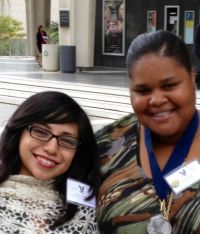On August 24 Black Nonbelievers of Atlanta will host Dr. Sikivu Hutchinson, author of Moral Combat: Black Atheists, Gender Politics, and the Values Wars (2011) and Godless Americana: Race & Religious Rebels. She is also the founder of Los Angeles’s Black Skeptics. “"Black Nonbelievers is honored to host Sikivu in the Atlanta area,” said Black Nonbelievers president Mandisa Thomas. “She is a true inspiration and fantastic representative––not only to freethinkers of color, but also the secular community as a whole. We hope as many people as possible come out to hear her message." Secular Woman president Kim Rippere will attend the event; Rippere says, “It is important and vital to reach out and support to all secular women in their endeavors in the secular community and in the broader community.” Secular Woman had the chance to ask Dr. Hutchinson a few questions about supporting people of color in atheism and feminism, prior to her presentation.
SW: Did you follow the #solidarityisforwhitewomen conversation on twitter last week? What do you think is the most important thing mainstream feminism needs to change to ensure an intersectional approach?
SH: I did not follow it closely but I saw a few tweets that spoke to the polarizing effect white privilege and white supremacy have on mainstream feminism. When there is no acknowledgment of white female privilege vis-a-vis cultural representation, political visibility, residential segregation, employment opportunities, and basic class mobility, then many feminists of color grow weary of claims of ally-building. For example, many feminists of color are deeply invested in seeking to redress the regime of mass incarceration, prison pipelining, and misogynist/homophobic violence that directly impacts the lives of straight and queer youth of color. Black women who have been convicted of nonviolent drug offenses compose the largest segment of the female prison population. The criminalization of Black women begins long before they are incarcerated in adult prisons. For example, Black girls have the highest rates of suspension/expulsion in the country and are more likely to have experienced sexual assault and domestic violence. The majority of female prisoners have experienced violence, abuse and assault. These are "intersectional" issues that are not typically focused on in the mainstream women's movement and are certainly not on the agenda of white secularist feminists.
SW: How can the atheist movement be better at community, serving those who come from particularly religious backgrounds?
SH: There are many "closeted" atheists in religious communities of color who identify with the social justice values and activist work of progressive community-based faith organizations. Unfortunately there are very few atheist/humanist organizations that explicitly align with and pursue social justice work. Radical and progressive humanist organizations that espouse alternatives to religion must be steeped in critical consciousness about how interlocking issues of racist, sexist, heterosexist, capitalist disenfranchisement specifically limit and impact people of color in traditionally religious communities. As I have argued in both Moral Combat and Godless Americana, it's problematic when white nonbelievers give lip service to being "down" with (what they deem to be) "oppressed" "hyper-religious" people of color while remaining willfully ignorant of how all whites benefit from overarching structures of white supremacy, racial apartheid, and patriarchy, which both inform and supersede religious hierarchies.
This year, Black Skeptics Los Angeles spearheaded its First in the Family Humanist scholarship program for undocumented, homeless, foster care and LGBTQ youth. These youth populations are at the epicenter of the school-to-prison pipeline and are the least likely to gain admittance to college, much less successfully graduate from college. Foster care youth are especially vulnerable to becoming homeless and incarcerated; while LGBTQ youth of color are overrepresented in both the foster care and homeless populations and are disproportionately targeted by law enforcement and school officials for detention and imprisonment. These youth are also the most likely to be victimized by homophobic religious persecution from their families, schools and churches. Why aren't any atheist or humanist organizations on the frontlines addressing this crisis? Because these are "invisible" issues that do not directly affect the predominantly white middle class constituencies of mainstream New Atheism or humanism. It is a privilege to wake up every day and "breathe while white", i.e., not have to worry about being criminalized, racially profiled or new Jim-Crowed in heavily policed racially segregated transit-dependent communities with no living wage jobs.
SW: What can Secular Woman do to better address and support the needs of women of color?
SH: Secular Woman can help foreground the importance of these issues for humanist movement building, especially if it is truly invested in building a social and gender justice-based "inclusive" secular/humanist/atheist movement. It can continue to support programming (like the Women's Leadership Project feminist mentoring program, BSLA's First in the Family scholarship program, and similar initiatives that don't expressly come from the secular community) that is specifically geared toward creating humanist educational avenues and opportunities for youth of color. It can also advocate for these initiatives within the broader atheist/humanist/secular community by taking an active stand on anti-racist feminist discourse. Finally, it can help promote our forthcoming Women of Color Beyond Faith anthology––which will be the first collection of critical essays on the subject by a multiracial group of American women.

 SW: What changes do you see in the girls as they progress through the program?
SW: What changes do you see in the girls as they progress through the program?